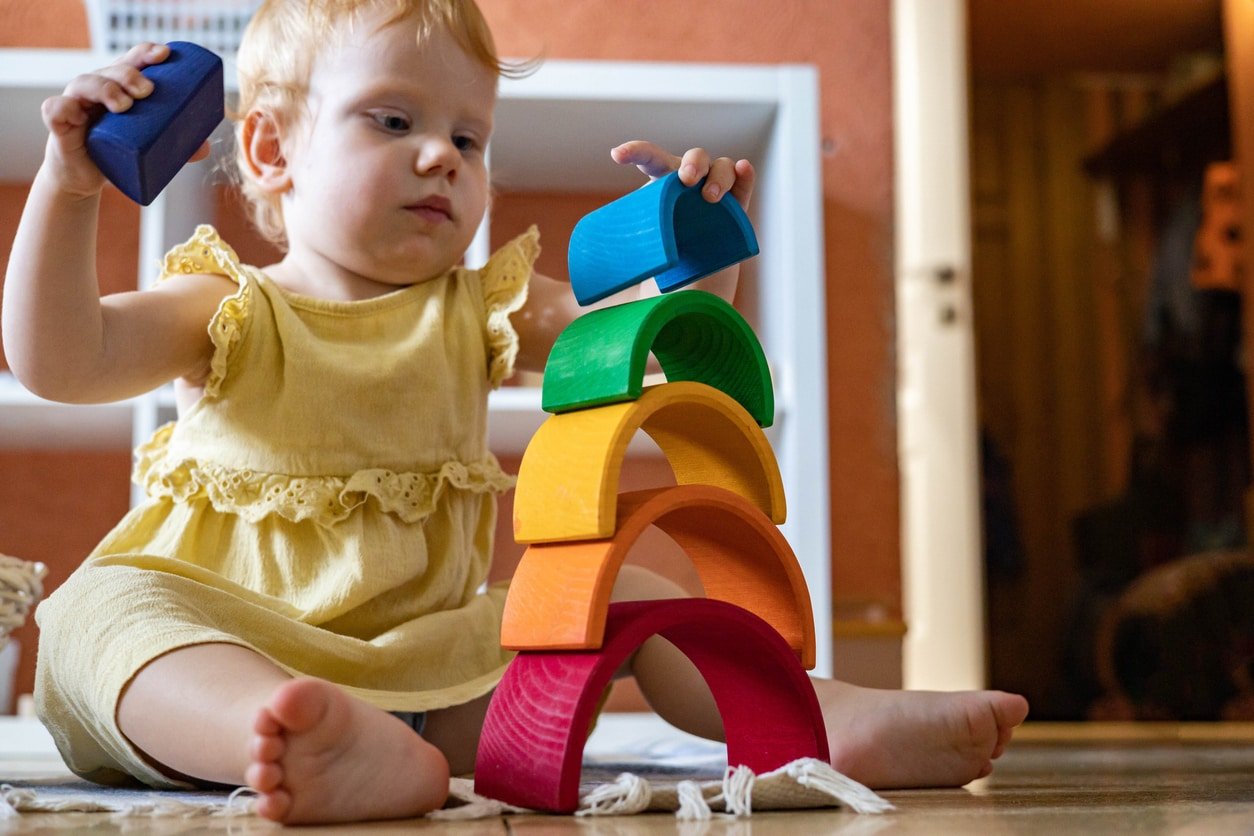When raising our little ones, we want the best for them. Healthy relationships, unlimited learning opportunities, everything that boosts their brain development — the list goes on and on. As parents, we don’t get to choose what our baby’s IQ is or if they grow up to be book lovers or STEM enthusiasts, but there are things we can do to boost their brain power. While there’s no foolproof guide for how to raise a genius, there are many ways to help them succeed now and in the future. A great place to start is taking inventory of important developmental milestones. From there, you can nurture and encourage different activities and incorporate superfoods to strengthen your baby’s cognitive abilities and brain development. In this article, we’ll explore 22 ways to build your baby’s brain power, including through food, brain-boosting activities, and cognitive activities for infants.
Signs of Development in Babies To Look Out For
If you’re trying to gauge your baby’s brain development, get familiar with where they are with developmental milestones.1 Every child will be different and meet milestones on their own time. However, there are guidelines to help you and your medical providers gauge how much support they may need. Here are a couple of emotional and social developmental infant milestones to keep an eye out for:2
- Between 1 and 3 months, you can expect your baby to be reacting and responding to your face and voice, smiling, giggling, and making noises like cooing.
- Between 4 and 6 months, they’ll begin exploring by putting things in their mouth. They’ll also start banging things together to make noises and following objects that leave their line of sight.
Keep in mind that there are many ways you can support your child’s development. The best part is that you may be planning to do (or already do) many of these infant activities and practices.
7 Superfoods To Fuel Baby’s Brain Development
Before your baby is even born, there are nutrients and superfoods you can introduce to aid in your baby’s brain development. According to the Journal of Pediatrics, the period from conception through the first three years of life is prime time for brain development.3 Let’s explore seven ways to fuel your baby’s brain power through food:
Foods for Mom

You can start by eating the right foods yourself, including:
- A prenatal vitamin: It’s recommended to take a daily prenatal vitamin. The iron and folic acid in these vitamins support the development of the placenta and prevent neural tube defects, respectively.4
- Omega-3s: Eat foods rich in omega-3, like fatty fish, seeds, and eggs. The healthy fat and protein in these foods help with long-term memory development.5,14
- Vitamin B: Eat foods rich in vitamin B, such as nuts, pork, and whole-grain pasta.13
If you’re looking for additional support and advice with your diet during pregnancy, ask your medical provider for recommendations for a nutritionist to work with. Additionally, visit ACOG’s website for general questions about and recommendations for a healthy pregnancy diet.5
Foods for Baby

Once your baby is born and they’re eating supplementary foods, here are some must-haves in their diet for healthy brain development:6
- Yogurt: Greek yogurt especially gives them a boost of vitamin B.7
- Nuts and seeds: The protein from nuts (such as walnuts and cashews) is excellent for development. It also helps with long-term memory.
- Leafy green vegetables: Iron found in many leafy green veggies, like spinach and kale, positively impacts the hippocampus, the part of your baby’s brain in charge of memory and learning.
- Beans: Several varieties (like kidney, pinto, and soybeans) contain nutrients like zinc, protein, iron, folate, and choline, which the American Academy of Pediatrics Committee recommends for healthy brain development.15
It’s also important to know that breastfeeding is one of the best ways to boost brain development. In fact, one study found a correlation between higher breast milk intake and higher IQ, better math skills, and better working memory in 7-year-old children.12
How Can I Improve My Child’s Brain Power? 8 Ways To Give Them a Boost
Try incorporating these eight brain-boosting infant activities to improve your child’s brain power. Depending on your child’s age, the complexity of these activities can vary:8
- Read to them: Reading together increases their vocabulary and builds literacy skills.
- Sing to them: Singing together supports the development of strong memory skills and language.
- Make eye contact: Research supports the idea that making eye contact with your little one encourages them to make noises to communicate.9
- Practice naming shapes and colors: This is something your child can do independently or something you can do together when they’re younger. When you hold up colors or shapes and name them, it sharpens their cognitive skills.
- Learn through play: This is an especially great exercise for young children. It allows them to build problem-solving skills and increase their imagination and creativity.
- Make faces: Even when your child is an infant, smiling at them and making faces set the foundation for them to recognize emotions.
- Play with noise-making toys: Using these toys helps them develop problem-solving skills. For instance, they may connect that a certain toy makes a certain sound.
- Play the name game: For example, when you touch and talk about parts of their body like their hands or their feet. You can talk about what feet do and count their toes.
7 Activities To Strengthen Brain Power: Cognitive Activities

The great thing about children’s cognitive needs is that many can be met and supported with beloved and classic games. Make strengthening their brain power and learning new things fun for both of you! Here are seven cognitive activities for infants to try:10
- Play matching games: These games and activities strengthen your infant’s analytical and communication skills and concentration.
- Play peek-a-boo: This game teaches your little one a cognitive skill called “object permanence.” This is when your child understands that even though they can’t see an object, it doesn’t cease to exist. They’ll continue to look for it, even when you cover it up.8
- Play with different textured and sized toys: Learning through play with activities involving touch helps infants discover the world around them.
- Create and follow routines: Building routines greatly benefits your little one’s developing brain. It’s a key part of learning self-regulation, which will help them now and in the future.
- Expose them to nursery rhymes: Activities involving nursery rhymes build your baby’s brain power with vocabulary and articulation.
- Do arts and crafts: These activities involve endless opportunities for learning, growth, and brain development, including critical thinking and problem-solving skills.
- Practice stacking: Activities that involve stacking help develop your child’s fine motor skills and practice problem-solving. For example, they have to figure out how to stack to keep the objects from falling.
Building Baby’s Brain Power
While these 22 ways to build your baby’s brain activity aren’t an exhaustive list, they give you a pretty solid foundation to start with. Adding these into your child’s day-to-day activities can strengthen their cognitive skills and support healthy brain development. Even though you can’t learn how to magically raise a genius overnight, you can work with your child to support their growth. Engaging and interacting with your child is the smartest way to make every day a learning opportunity.































